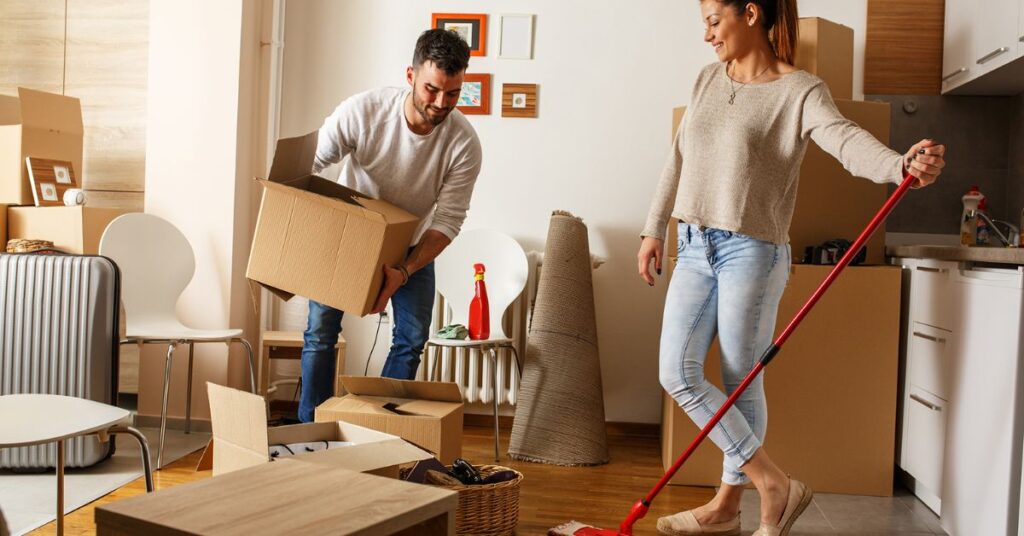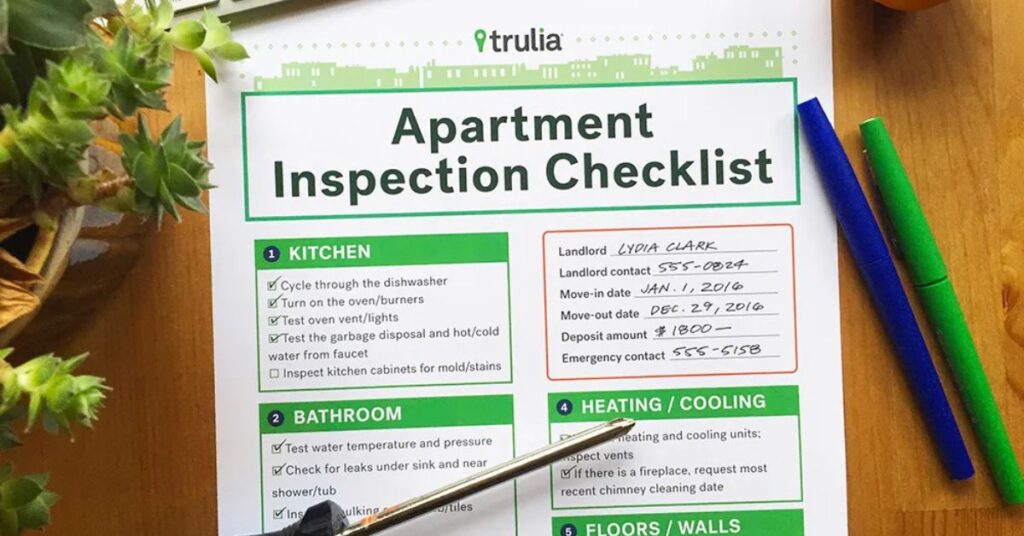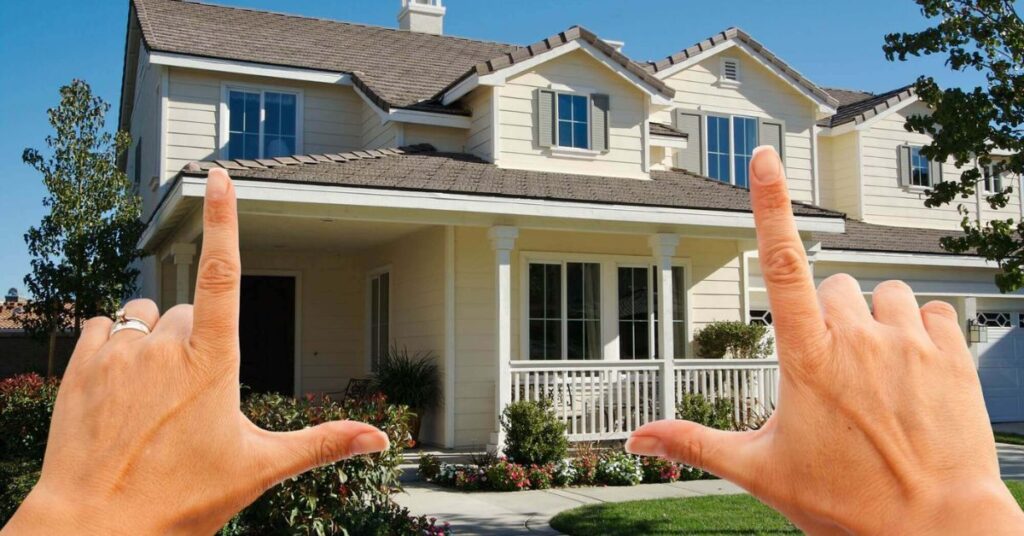Let’s dive in and uncover the facts! Apartment inspections can vary in duration. Factors like the size of the apartment and the thoroughness of the inspection play a role. But fear not, we’ll guide you through the process step by step, so you know exactly what to expect.
First off, apartment inspections typically last between 30 minutes to an hour. However, this can fluctuate depending on the complexity of the inspection. Factors such as the number of rooms, the condition of the apartment, and any specific areas of concern can influence the duration.
Rest assured, though, that inspectors work efficiently to ensure a thorough examination while minimizing disruption to your day. So sit back, relax, and let’s unravel the mystery of apartment
How Do You Prepare for an Apartment Inspection?

Preparing for an apartment inspection is essential to ensure a smooth process and a positive outcome. Here’s a simple guide to help you get ready:
Clean and Tidy
Start by tidying up your apartment. Declutter surfaces, organize belongings, and ensure rooms are neat and presentable. A clean apartment not only makes a good impression but also allows the inspector to assess the property more effectively.
Check for Maintenance Issues
Take a walk through your apartment and inspect for any maintenance issues. Look for leaky faucets, malfunctioning appliances, or any signs of damage that may need attention. Addressing these issues beforehand can prevent potential deductions or concerns during the inspection.
Safety First
Ensure that your apartment meets safety standards. Check smoke detectors, carbon monoxide detectors, and fire extinguishers to ensure they are functioning correctly. Replace batteries if needed and make any necessary repairs to ensure the safety of your home.
Documentation
Gather any relevant documentation that may be required for the inspection. This may include lease agreements, maintenance records, or receipts for recent repairs or upgrades. Having these documents on hand can help streamline the inspection process and provide necessary information to the inspector.
Pets and Personal Items
If you have pets, make arrangements for them to be safely secured or temporarily removed during the inspection. Additionally, secure any personal items or valuables to ensure they are not accidentally damaged or misplaced during the inspection.
Be Present
Plan to be present during the inspection or ensure that someone trustworthy can be there in your absence. This allows you to address any questions or concerns the inspector may have and ensures that the process goes smoothly.
Apartment Inspection Checklist

Preparing for an apartment inspection? Here’s a handy checklist to ensure you’ve covered all the bases:
Clean and Tidy
- Clean all surfaces, including countertops, floors, and appliances.
- Declutter living spaces and organize belongings.
- Ensure windows and mirrors are clean.
Maintenance Check
- Inspect for any leaks or water damage in sinks, faucets, and ceilings.
- Test all lights and switches to ensure they are working properly.
- Check HVAC systems for proper functioning and cleanliness.
- Test smoke detectors, carbon monoxide detectors, and fire extinguishers.
- Replace batteries as needed.
Safety Measures
- Ensure all exits are clear and accessible.
- Secure any loose rugs or carpets to prevent tripping hazards.
- Check locks on doors and windows for security.
- Remove any hazardous materials or chemicals from reach.
Appliance Inspection
- Test all appliances, including stove, oven, refrigerator, dishwasher, and microwave.
- Clean out refrigerator and freezer, disposing of any expired items.
- Check for signs of wear or damage on appliances.
Utilities and Systems
- Ensure all utilities are in working order, including water, electricity, and gas.
- Check for any leaks or drips in plumbing fixtures.
- Test water pressure in sinks, showers, and toilets.
Exterior Inspection
- Inspect the exterior of the apartment for any damage or signs of wear.
- Check for proper drainage around the building.
- Ensure outdoor areas, such as balconies or patios, are clean and free of debris.
Documentation and Records
- Gather relevant documentation, including lease agreements, maintenance records, and repair receipts.
- Have a copy of your rental insurance policy handy, if applicable.
Pet and Personal Items
- Make arrangements for pets to be safely secured or temporarily removed during the inspection.
- Secure any personal items or valuables to prevent damage or loss.
Be Present
- Plan to be present during the inspection or arrange for someone trustworthy to be there in your absence.
- Be prepared to address any questions or concerns the inspector may have.
Floors
Floor Inspection
- Vacuum or sweep all flooring surfaces to remove dust, dirt, and debris.
- Clean any stains or spills on carpets, rugs, or hardwood floors.
- Inspect flooring for any signs of damage, such as scratches, cracks, or warping.
- Test for squeaky floorboards or loose tiles.
- Ensure that floor coverings, such as area rugs or mats, are properly secured and in good condition.
- Check grout lines in tile flooring for any signs of wear or discoloration.
- Pay special attention to high-traffic areas for signs of excessive wear and tear.
- Consider scheduling professional carpet cleaning or floor refinishing if needed.
Walls
Wall Inspection
- Examine all walls for cracks, holes, or dents.
- Repair any damages using spackling paste or filler and touch up with matching paint.
- Check for signs of water damage, such as stains or discoloration, especially near sinks, showers, or windows.
- Inspect wallpaper for tears, peeling, or bubbling and repair or replace as needed.
- Ensure that wall-mounted fixtures, such as shelves or artwork, are securely attached and not causing damage to the walls.
- Clean walls with a mild detergent solution to remove dirt, dust, or marks.
- Pay attention to corners and edges where dirt and dust tend to accumulate.
- Consider applying a fresh coat of paint to refresh the walls and enhance the overall appearance of the room.
Electricity
| Electricity Inspection |
| 1. Test all light switches and electrical outlets. |
| 2. Check for damage or wear on outlet covers and switch plates. |
| 3. Verify proper grounding and stability of outlets. |
| 4. Inspect electrical cords for damage or fraying. |
| 5. Test functionality of all light fixtures and appliances. |
| 6. Check circuit breaker panel for tripped breakers. |
| 7. Ensure all appliances are plugged in securely. |
| 8. Consider installing surge protectors or GFCI outlets. |
HVAC
During the apartment inspection, it’s crucial to assess the Heating, Ventilation, and Air Conditioning (HVAC) system thoroughly. Begin by checking the thermostat settings and operation to ensure they’re functioning correctly.
Test both the heating and cooling modes separately to verify their effectiveness. Additionally, inspect the air filters and replace them if they’re dirty or clogged to maintain optimal indoor air quality. Ensure that vents and registers are clean and unobstructed to facilitate proper airflow throughout the apartment.
Listen for any unusual noises or vibrations coming from the HVAC system, as they could indicate underlying issues. Also, check for leaks or condensation around the unit, which may require immediate attention.
Pests
As part of the apartment inspection, it’s essential to assess for any signs of pests. Begin by thoroughly examining all areas, including corners, cabinets, and hidden spaces, for indications of pest activity such as droppings, gnaw marks, or nesting materials.
Pay particular attention to areas near food sources, water outlets, and entry points such as windows or doors. Check for any cracks or gaps in walls, floors, or ceilings that could serve as entry points for pests.
If you discover any evidence of pests, take prompt action to address the issue, such as sealing entry points, cleaning affected areas, or contacting a pest control professional for assistance.
By conducting a thorough pests inspection, you can ensure a pest-free and comfortable living environment for yourself and future occupants of the apartment.
How Long Do Apartment Inspections Take?
| Duration of Apartment Inspections |
| Typically 30 minutes to 1 hour |
| Factors influencing duration: |
| – Size of the apartment |
| – Thoroughness of the inspection |
| – Specific areas of concern |
What Is an Apartment Inspection?
An apartment inspection is a systematic assessment of a rental property conducted by either the landlord, property manager, or a professional inspector. The purpose of an apartment inspection is to evaluate the condition of the unit and identify any maintenance issues, damages, or safety concerns.
During an apartment inspection, various aspects of the property are examined, including the condition of the walls, floors, appliances, plumbing fixtures, electrical systems, HVAC (Heating, Ventilation, and Air Conditioning) systems, and other amenities.
The inspection may also involve checking for pest infestations, ensuring compliance with building codes and safety regulations, and verifying that the property meets the standards outlined in the lease agreement.
Apartment inspections may be conducted before a tenant moves in, periodically during the tenancy, or when the tenant moves out. Pre-move-in inspections help document the condition of the property before the tenant takes occupancy, while periodic inspections help ensure that the property is being maintained properly and address any issues promptly.
How much notice should your landlord give you?

The amount of notice your landlord is required to give you varies depending on the reason for the notice and the laws and regulations in your specific location.
However, in many jurisdictions, landlords are typically required to provide tenants with advance notice before entering the rental property for non-emergency reasons such as inspections or repairs.
In general, landlords are often required to provide notice ranging from 24 hours to 48 hours before entering the rental unit. This notice period allows tenants to prepare for the landlord’s visit and ensures that their privacy is respected.
It’s important to familiarize yourself with the specific laws and regulations governing landlord-tenant relationships in your area, as they can vary significantly. You can typically find this information in your lease agreement or by consulting local housing authorities or tenant advocacy organizations.
Read As: DO I HAVE TO PAY RENT AFTER EVICTION NOTICE?
Frequently asked question
How long does an apartment inspection usually take?
Typically, apartment inspections take between 30 minutes to 1 hour.
What factors influence the duration of an apartment inspection?
The size of the apartment, the thoroughness of the inspection, and any specific areas of concern can affect the duration.
Do I need to be present during the apartment inspection?
It’s advisable to be present during the inspection or have someone trustworthy represent you to address any questions or concerns.
What should I do to prepare for an apartment inspection?
Clean and tidy your apartment, address any maintenance issues, ensure safety measures are in place, gather relevant documentation, and secure pets and personal items.
Can I request an apartment inspection at a specific time?
You may request a specific time for the inspection, but it ultimately depends on the availability of the landlord or property manager.
How often are apartment inspections conducted?
Apartment inspections may be conducted before move-in, periodically during the tenancy, or at the end of the lease term when the tenant moves out.
What happens during an apartment inspection?
The inspector assesses various aspects of the property, including walls, floors, appliances, HVAC systems, plumbing fixtures, and safety measures.
Can I refuse an apartment inspection?
Generally, tenants are required to allow reasonable access to apartment inspections as outlined in the lease agreement and local laws. Refusing access may have legal consequences.
Conclusion
In conclusion, the duration of apartment inspections can vary depending on several factors such as the size of the apartment, the thoroughness of the inspection, and any specific areas of concern. Typically, apartment inspections take between 30 minutes to 1 hour to complete.
However, it’s important to note that this timeframe is not set in stone and may fluctuate based on individual circumstances. By understanding the factors influencing the duration of apartment inspections and being prepared for the process, tenants can ensure a smooth and efficient assessment of their rental property.
Whether it’s preparing the apartment beforehand, being present during the inspection, or addressing any maintenance issues promptly, proactive measures can help streamline the inspection process and maintain a positive landlord-tenant relationship.

James, with 5 years of business experience, brings expertise to our website. His profile reflects a commitment to excellence and innovation in his field.







